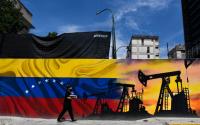September 28 2009
by Michael McGehee
According to the UN's Food and Agriculture Organization (FAO) nearly a billion people are starving at the end of each day. That is fourteen percent of the world's population. Almost forty-years ago the infamous social gadfly Noam Chomsky said, "We have today the technical and material resources to meet man's animal needs. We have not developed the cultural and moral resources or the democratic forms of social organization that make possible the humane and rational use of our material wealth and power. [...] To create such a movement is a challenge we face and must meet if there is to be an escape from contemporary barbarism." This "contemporary barbarism" has not been escaped. It has deepened but is beginning to show signs of cracks in the edifice. Though this may offer us an opportunity to build "another world" more responsive to the needs of all, we should take great caution to protect the most vulnerable among us from falling helplessly into the cracks. While important foodstuffs are currently being diverted for overconsumption in the developed world - i.e., fuel or beer or livestock feed - those at the bottom of Life's barrel in the developing world struggle with not getting enough to eat. They have more to worry about than watching NASCAR driver's waste gas, or whether they stocked up on enough booze for the weekend's block party, or if their pure-bred Samoyed has the finest food. In Haiti, where riots over rising food prices were violent, this starvation was giving the name "Clorox hunger" because the hunger pains were "so torturous that people felt like their stomachs were being eaten away by bleach or battery acid." This was reported in an Al Jazeera news story that Walden Bello cites in his recent book, The Food Wars. Walden Bello is a professor of sociology at the University of the Philippines, author of numerous books and essays, and senior analyst for Focus on the Global South. Born in Manila in 1945 he relocated to the US in the early 1970s to study at Harvard where he got his PhD in sociology. It was during the martial law era of former-President of the Philippines, Ferdinand Marcos, that Bello began his long career into political activism. Bello's book asks and answers: what happened, what were the causes of the rise in food prices, what were its effects and where can we go from here? From 2006 and 2008 the price of foodstuffs spiraled out of control - and for many countries they still are. The consequences of this has been the pushing of tens of millions more people into poverty and hunger, the ignition of violent protests and riots around the world, and the undermining of what growing solidarity there was in the developing world. There are various, widely claimed causes. Bello writes that many from the media and academia claimed the causes were the failure of poorer countries to develop their agricultural sectors; strains on the international food supply created by dietary changes among China's and India' expanding middle classes; speculation in commodity futures; the conversion of farmland into urban real estate; and the diversion of corn and sugarcane from food production to the production of agrofuels. He also states that: certainly, a vital, if not the central force behind the food price crisis of 2006 to 2008 was the massive agriculture policy reorientation known as ‘structural adjustment' [...] imposed by the World Bank and International Monetary Fund on more than ninety developing and transitional economies over a twenty-year period beginning in the early 1980s. For much of the world the culprit is simply known as neoliberalism. The structural adjustment policies (SAPs) that were demanded in order to receive aid from the international financial institutions (IFIs) were the main reason for "the failure of poorer countries to develop their own agricultural sectors." In other words, they are set up to fail because that is how they fit into the framework of globalization-from-above by the developed economies. Their place is to provide cheap resources for the developed world, not to compete; and to accept our cheap subsidized goods like the wheat or corn produced here in the US (the latter being a topic in chapter two when asking, "How on earth had Mexicans, who lived in the land where corn was first domesticated, become dependent on imports of US corn in the first place?"). Undermining peasant and smaller-sized farms has also had a tremendous effect on productivity. Industrial farms have shown to be less efficient per acre than the smaller farms. There is also an ecological impact since small farms are not as reliant on pesticides and monoculture as industrial ones. The claim that there are "strains on the international food supply" is also open to interpretation. Clearly there is a strain but not one of production, but rather allocation through markets in a global capitalist scheme as Bello points out, To capital, food, feed, and agrofuels are interchangeable as investment areas, with rates of profit determining where investment will be allocated. Satisfying the real needs of the global majority is a secondary consideration, if indeed it enters the calculation at all. To the critics of capitalist agriculture, it is this devaluation and inversion of real relations into abstract relations of exchange - otherwise known as commodification - that is at the crux of the crisis of the contemporary food system. Speculation has had an effect too. When it is observed that prices may go up some purchased and stored the food in order to demand higher prices. And then there is dumping, in which Bello wrote, Europe's main problem with its agricultural production has, in fact, been the overproduction and dumping arising from heavy subsidization. This was recently highlighted in the current case of the European dairy crisis. The group Via Campesina stated in a press release that they call "on taxpayers to refuse that the EU budget be used to export dairy products at prices below production costs (dumping) - which ruin local dairy production in Southern countries." The argument from the proponents of the developed world's corporate-led globalization is that the US's and EU's (subsidized) agricultural products are often cheaper than what it would cost those in the developing world to produce, so they should buy it from them. But as Via points out, these cheaper goods destroys their local food industries and puts many out of work. This leaves the question to be begged: What good does the cheaper prices matter if they cannot afford it? As I was reading Bello's book I could not help but wonder what state the environment would be in if we utilized smaller, autonomous and self-governed farms (though linked through various workers and consumers assemblies) using less chemicals and pesticides. If we didn't dump, waste, overproduce and overconsume, and if we weren't driven by profit motive, but instead by meeting needs, utilizing comparative advantages in socially advantageous ways instead of economically and politically dominating ways, would this have a positive impact on political and economic structures, social relations, poverty, hunger and the environment? While this isn't the topic of the book it does more than nurture the thought and provides another outlet for various issues to come together and join ranks. At the end of the first chapter, Capitalism versus the Peasant, Bello writes that, peasant and small-farmer based agriculture serving local and regional markets might increasingly be seen as a more viable way to organize the production of food. While he doesn't call it out by name it seems he is referring to bioregionalism. Being efficient and equitable is desirable, but one may argue that not all regions can be self-sufficient, leaving me to wonder if another alternative like participatory planning - as described by Robin Hahnel and Michael Albert in Participatory Economics - deserves closer attention and consideration. The Food Wars peers deeply in to how neoliberalism created the environment for the food price crisis, and examines its effect around the world. Bello takes us through the hardships of Mexico, the Philippines, Africa and China. In Mexico (which Bello says is "exhibit A in the case against neoliberalism"), we learn how agrarian reform in the Mexican Revolution stabilized the countryside for decades but when the structural adjustment policies as outlined by the Washington Consensus and the IFIs forced Mexico to make radical changes it devastated small farmers, plagued the country with druglords, and sent millions north of the border in search of relief. As Bello writes, The food-price crisis in Mexico must be seen as one element in the concentration of crises that have rocked the country over three decades and brought it to the verge of collapse. The key link between the food crisis, the drug wars, and the massive migration to the North has been structural adjustment. In the Philippines and in Africa, Bello notes the same underlying problems that led the countries to import food when they were previously net exporters: neoliberalism's structural adjustment policies. State intervention to protect farmers through subsidies and agrarian reforms were cut to make way for the developed world to dump their subsidized agriculture on them at prices lower than they could compete. Thus, one could buy corn at the store cheaper than they could grow it. Next, in China Bello examines how the country managed to be virtually self-reliant for decades, but the increase of meat into the diets of many Chinese, making China more reliant on other countries like Brazil to accommodate their new consumption trends, coupled with joining the World Trade Organization (WTO), which has altered their priorities to industrialization (and being a manufacturing base for the globe) over agriculture (leaving millions of farmers behind), is having an adverse effect on the environment and their ability to feed themselves, which will be a factor in future food prices. He goes on to say that "today's deepening global economic crisis may counteract these trends." This should not be celebrated since undoubtedly those at the bottom will pay the highest prices for it. Instead we should look to find ways to (a) cushion the blow of a collapsing system; and (b) replace it with something more efficient, just and humane. The Food Wars then looks at how agrofuels has failed at improving social conditions and has been a big factor in food insecurity. While proponents of agrofuels and biodiesel have claimed that it is renewable, sustainable, will help development, won't impact food prices and so on, it has born out to be simply false. As the US and EU seek to capitalize on agrofuels as an industrial business the developing countries, places like Brazil, Malaysia, the Philippines and others have all too willingly succumbed to market pressures to move their agriculture production from food to fuel. This has shown as Bello documents an attack on the environment and human rights. Finally, Bello closes with the rise of peasant movements, like Via Campesina, to see how those at the bottom are mobilizing to reclaim their lives (another recent example was the successful struggle in Peru by indigenous people who fought off the transferring of land to foreign investors - i.e., US). He looks at prominent figures like José Bové, the french farmer who received global attention for dismantling a McDonald's in 1999, and Lee Kyung Hae, the Korean activist who committed suicide in Cancún, Mexico during the WTO protests in 2003. One thing in particular that resonated with me was when describing the internal structures of Via. The building of coalitions and broad networks responsive to its members, the use of direct and representative democracy, along with various tactics depending on the moment, to transform and build a new society, is something I think should be carried out elsewhere too. At the heart of the nascent peasant movements is the recognition that capitalism must be replaced if we are to build a just and equitable society and that to begin replacing it we must start with our own organizations. The group also recognizes the interconnecting relationships between gender, political, economic and community relations and how the issues we face today are certainly more than market effects on food prices or distribution. It is interconnected with other issues like the environment, emigration, livestock farming, and indigenous and women's struggles (among others). The Food Wars is well researched, well written and well presented to the reader. While it leaves room for more questions and topics of discussions, anyone concerned with these issues - which, according to the US Census Bureau, should be all 6.786 billion of us - would be well served by reading this book.






